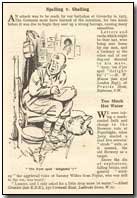Memoirs & Diaries - The Best 500 Cockney War Stories - Too Much Hot Water and Other Stories
 Published in London
in 1921, The Best 500 Cockney War Stories
comprised, in the words of its newspaper publisher (The London Evening
News) "a remembering and retelling of those war days when laughter
sometimes saved men's reason".
Published in London
in 1921, The Best 500 Cockney War Stories
comprised, in the words of its newspaper publisher (The London Evening
News) "a remembering and retelling of those war days when laughter
sometimes saved men's reason".
The collection of short memoirs, some 500 in total, is divided into five categories - Action, Lull, Hospital, High Seas and Here and There. This page contains five stories from Action, led by Too Much Hot Water.
Other sections within the collection can be accessed using the sidebar to the right.
Too Much Hot Water
We were taking a much-needed bath and change in the Brewery vats at Poperinghe, when Jerry started a mad five minutes' "strafe" with, as it seemed, the old Brewery as a target.
Above the din of explosions, falling bricks, and general "wind-up" the aggrieved voice of Sammy Wilkes from Poplar, who was still in the vat, was heard:
"Lumme, and I only asked for a little drop more 'ot water."
Albert Girardot (late K.R.R.), 250 Cornwall Road, Ladbroke Grove, W.11
"Ducks and Drakes! Ducks and Drakes!"
After the evacuation of the Dardanelles the "Drakes" of the Royal Naval Division were ordered to France.
Amongst them was Jack (his real name was John). A young Soccer player, swift of foot, he was chosen as a "runner."
One day he tumbled into a shell hole. And just as he had recovered his wits in came Colonel Freyberg, V.C., somewhat wounded.
Seeing Jack, he told him he was just the boy he wanted - the lad had run away from home to join up before he was seventeen - and scribbling a note the colonel handed it to him.
The boy was told if he delivered it safely he could help the colonel to take Beaucourt. Jack began to scramble out. It was none too inviting, for shells were bursting in all directions, and it was much more comfortable inside.
With a wide vocabulary from the Old Kent Road, he timely remembered that his father was a clergyman, and muttering to himself, "Ducks and drakes, ducks and drakes," he reached the top and went on his way.
The sequel was that the message was delivered, reinforcements came up, led by the boy to the colonel, and Beaucourt was taken.
Father Hughes, 60 Hainault Avenue, Westcliff-on-Sea
You Must Have Discipline
On September 14, 1916, at Angle Wood on the Somme, the 168th (London) Brigade Signals were unloading a limber on a slope, on top of which was a battery which Jerry was trying to find.
One of his shells found us, knocking all of us over and wounding nine or ten of us (one fatally).
As the smoke and dust cleared, our Cockney sergeant (an old soldier whose slogan was "You must have discipline") gradually rose to a sitting position, and, whipping out his notebook and pencil, called "Nah, then, oo's wounded?" and calmly proceeded to write down names.
Wm. R. Smith (late R.E. Signals), 231 Halley Road, Manor Park, E.12
L.B.W. in Mespot
At a certain period during the operations in Mesopotamia so dependent were both the British and the Turks on the supply of water from the Tigris that it became an unwritten law that water-carriers from both sides were not to be sniped at.
This went on until a fresh British regiment, not having had the position explained, fired on a party of Turks as they were returning from the river. The next time we went down to get water the Turks, of course, returned the compliment; so from then onwards all water carrying had to be done under cover of darkness.
On one of these occasions a Turkish sniper peppered our water party as they were returning to our lines. They all got back, however; but one, a man from Limehouse, was seen to be struggling with his water container only half full, and at the same time it was noticed that his trousers and boots were saturated.
"Hi!" shouted the sergeant, "you've lost half the water. Did that sniper get your bucket?"
"Not 'im," replied the Cockney, "I saw to that. 'E only got me leg."
What, in the darkness, appeared to be water spilt from the bucket was really the result of a nasty flesh wound.
J. M. Rendle (Lieut., I.A.R.O.), White Cottage, St. Leonard's Gardens, Hove, Sussex
Trench-er Work
We were attacking Messines Ridge.
The ground was a mass of flooded shell-holes. Hearing a splash and some cursing in a familiar voice, I called out, "Are you all right, Tubby?"
The reply came, as he crawled out of a miniature mine crater, "Yus, but I've lorst me 'ipe (rifle)."
I asked what he was going to do, and he replied, "You dig them German sausages out with yer baynit and I'll eat 'em."
So saying, he pulled out his knife and fork and proceeded towards the enemy trenches.
"Pip Don" (London Regt.), 22 Ingram Road, Thornton Heath
Next - The Best Man - Goes Fust and four other stories
The USA suffered 57,476 fatal army casualties during the war.
- Did you know?
